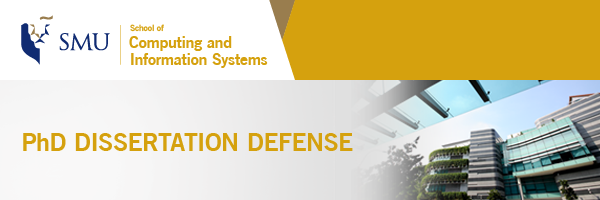| |
 | | | Correlation and Causation Analysis for Cross-Sectional and Panel Data |  | Barry NUQOBA PhD Candidate
School of Computing and Information Systems
Singapore Management University
| Research Area Dissertation Committee Research Advisor Co-Research Advisor Dissertation Committee Member External Member |
| | Date 13 November 2024 (Wednesday) | Time 10:30am – 12:30pm | Venue Meeting room 5.1,
Level 5
School of Computing and Information Systems 1,
Singapore Management University,
80 Stamford Road,
Singapore 178902 | Please register by 12 November 2024. We look forward to seeing you at this research seminar. 
|
|
|
| | ABOUT THE TALK Advancements in healthcare technologies have extended life spans, but many older adults face poor well-being in their final years due to factors like loneliness and chronic conditions. This study addresses the integration of passive, unobtrusive sensor technologies and machine learning to detect symptoms such as nocturia and poor sleep quality among seniors, utilizing passive in-home sensors. By correlating sensor data with psychosocial survey results, we demonstrate the potential for early detection and intervention, emphasizing the significance of healthy behaviors at home.
Building on this foundation, we explore causal relationships in human behavior using the Singapore Life Panel data. Our research identifies causal discovery algorithms as promising tools for exploring causal relationships, while also highlighting the need for domain expertise to ensure reliable results. We propose a collaborative framework that merges domain knowledge with causal discovery methods, successfully mapping links between various social activities and life satisfaction. This study underscores the importance of integrating data-driven insights with expert interpretation, paving the way for future research to refine methodologies and enhance the understanding of well-being in older adults. | | | ABOUT THE SPEAKER Barry researches the intersection of computer science, healthcare, and social sciences, focusing on correlation-based algorithms for preventive care and causal-based algorithms to explore social phenomena. He joined the SHINESeniors project in his first year of PhD, which initiated his research journey. From 2022 to 2024, he developed his skills at the Centre for Research on Successful Ageing (ROSA), working on integrating causal algorithms with domain expertise. In his leisure time, Barry enjoys walks and coffee, which provide a perfect balance to his research life. |
|